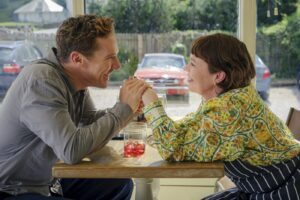Movie Review: In ‘The Roses,’ Benedict Cumberbatch and Olivia Colman make a love story dark
By Canadian Press on August 27, 2025.
“The Roses” begins in a marriage therapist’s office, where Theo Rose has something interesting to say about his longtime wife, Ivy: “I would rather live with her than a wolf.” That’s especially interesting because the question the therapist posed was: What are 10 things you love about each other?
After a few minutes of blistering barbs back and forth — Ivy suggests that one good thing about her husband is “he has arms” — the therapist is appalled and resigned. “I see so much resentment, I don’t think you have the capacity to fix your problems,” she tells them.
There are dark marriage comedies and then there’s “The Roses,” an escalating hatefest that, by the time a loaded gun comes out, all the fun has been sucked out. It’s hard tonally to go from microaggressions to the burning of someone’s prized books to attempted murder and stay a comedy.
That was the trap that sunk the Danny DeVito-directed 1989 version “The War of the Roses” and it’s the same quicksand that makes the Jay Roach-directed “The Roses” so unpleasant. Seeing a marriage implode with such ferocity, with both participants hoping to extract maximum hurt, is like having “Marriage Story” on MDMA.
Benedict Cumberbatch and
Olivia Colman naturally bring a certain dry Britishness to roles originally portrayed by Michael Douglas and Kathleen Turner. They are witty and arch, sarcastic and passive-aggressive. You believe their love but you also believe they can hate each other.
He is a prickly, high-flying architect — adding artistic flourishes like cascading balconies — and she is a stalled chef — weirdly able to make both elaborate, sculptural desserts and down-home seafood — who are raising their two teenagers when the action gets going. His career hits a horrific roadblock and hers takes flight when she opens the restaurant We’ve Got Crabs!
Switching roles, Cumberbatch’s Theo now becomes the laundry-folding, kids’ lunch maker — “I could build children instead of houses,” he says — while Colman’s Ivy jets off to cook with
David Chang while her Champagne flute is being topped up.
Screenwriter Tony McNamara plops these bickering twosomes in the affluent California enclave of Mendocino, a place of ample negronis and Audis. He surrounds them with a motley group, including a couple,
Andy Samberg and
Kate McKinnon, dealing with their own marriage inertia.
Samberg has perhaps the most sad line when he says of his wife: “When we were younger, I knew what she was going to say before she said it. Now I don’t know what she’s said after she’s said it.” For her part, McKinnon does her bug-eyed, off-kilter, hypersexual thing — a tiresome character that she seems to only do now after reaching its apex in
“Barbie.”
Theo takes charge of the kids — including daily wind sprints and Charles Bukowski quotes — while Ivy misses key home moments, like her daughter’s first period. Resentments build and their friends notice “sporadic, dizzying waves of hatred.” Neither want to apologize or budge. One has a “bottomless pit of need” and the other has “caustic narcissism.” Deepfake videos posted to harm his client list lead to him hacking into her restaurant vendors to screw up supplies. Then the shooting begins.
The problem with “The Roses” — 1989 or 2025 — is it doesn’t know what it wants to say about marriage. Maybe that fervent love eventually curdles and we should just find the moments of joy that remain? That only someone who loves you can hurt you so exquisitely? That we should never let small resentments metastasize or change roles mid-marriage? That we should never, ever get back together?
Perhaps it’s that we constantly try to tap into the deep well of love that started it all. One terrific line Ivy says to Theo sums it up: “You stopped. You’re not supposed to stop.”
“The Roses,” a Searchlight Pictures release that’s in theaters Friday, is rated R for “language throughout, sexual content and drug content.” Running time: 105 minutes. Two stars out of four.
Mark Kennedy, The Associated Press
17
-16





